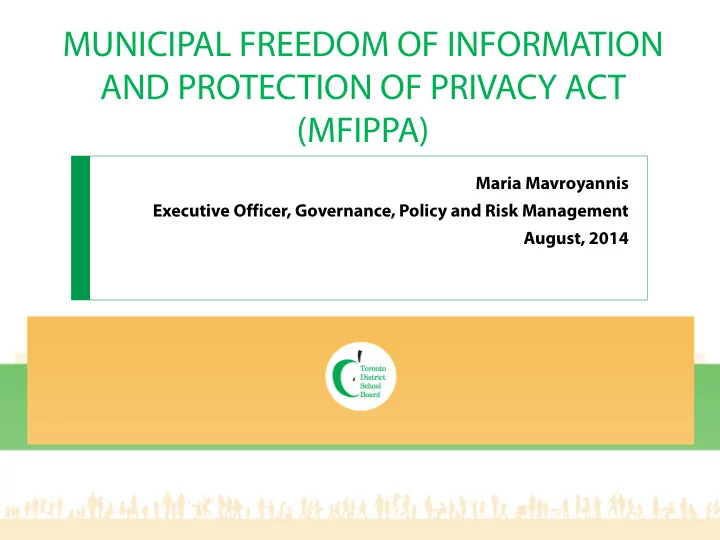

MUNICIPAL FREEDOM OF INFORMATION AND PROTECTION OF PRIVACY ACT (MFIPPA) Maria Mavroyannis Executive Officer, Governance, Policy and Risk Management August, 2014
WHAT IS MFIPPA? • MFIPPA applies to municipalities, boards, agencies and commissions. This may include information held by a city clerk, a school board, board of health, public utility or police commission. • The Act creates a privacy protection scheme which the government must follow to protect an individual’s right to privacy. This includes rules regarding the collection, retention, use, disclosure and disposal of personal information in its custody or control. 2
LEGAL OBLIGATIONS • The Act requires that local government organizations protect the privacy of an individual’s personal information existing in government records. • The Act also gives individuals the right to request access to municipal government information, including most general records and records containing their own personal information. 3
EXEMPTIONS • The Board must provide access unless the information is exempt under the Act (Section 6-16): Draft by-laws Advice or recommendations Law enforcement Civil remedies Act, 2001 Prohibiting Profiting from Recounting Crimes Act, 2002 Relations with governments Third party information Economic and other interests Solicitor-client privilege Danger to safety or health Personal privacy Information soon to be published Exemptions not to apply 4
PROCESS • Members of the public or an individual may make a request in writing to the Board’s Freedom of Information Coordinator. • A $5.00 application fee must accompany the request. The requester may also be charged for the time required to locate and prepare records (fee estimate). • The Board must respond within 30 calendar days of receipt of the request. However, under some circumstances an extension may be required. • Once the requester receives the response, they have the right to appeal within 30 days. 5
PRIVACY BREACHES • A privacy breach occurs when personal information is collected, retained, used or disclosed in ways that are not in accordance with the provisions of the Act. • For example, personal information may be lost (a file is misplaced), stolen or inadvertently disclosed through human error (letter addressed to person A is mailed to person B). • All privacy breaches must be reported to the Freedom of Information Coordinator who in turn will report the breach to the Information and Privacy Commissioner. 6
QUESTIONS? Questions regarding MFIPPA or privacy breaches can be directed to Denisse Parra, 416-397-3365 or denisse.parra@tdsb.on.ca RESOURCES/REFERENCE DOCUMENTS: • Municipal Freedom of Information and Protection of Privacy Act • TDSB PR676 – Freedom of Information and Protection of Privacy • Privacy Breach Protocol: Guidelines for Government Organizations 7
Recommend
More recommend